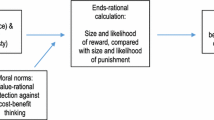Abstract
The question on what the purpose of teachingbusiness ethics should be, never fails todivide opinion. In this article three basicpositions taken with regard to this questionare distinguished. They are the cognitivecompetence, the behavioural competence and themanagerial competence positions. Once the coreof each these positions has been identified,the ontological presuppositions underlying eachof them is retrieved. It is then argued thatthese three positions and their accompanyingpresuppositions should not be regarded as rivalpositions, but as complementary approaches inteaching business ethics. Finally the teachingstrategies required by each of these threepositions are discussed.
Similar content being viewed by others
REFERENCES
Adams, J. S., C. Harris and S. S. Carley: 1998, 'Challenges in Teaching Business Ethics: Using Role Set Analysis of Early Career Dilemmas', Journal of Business Ethics 17(12), 1325–1335.
Anderson, J.: 1997, 'What Cognitive Science Tells us about Ethics and the Teaching of Ethics', Journal of Business Ethics 16, 279–291.
Berger, J. and C. B. Pratt: 1998, 'Teaching Business Ethics - Communication Ethics with Controversial Films', Journal of Business Ethics 17(16), 1817–1823.
Binns, P.: 1994, 'Ethical Business: Thinking Thoughts and Facilitating Processes', Business Ethics: A European Review 3(3), 174–179.
Chryssides, G. D. and J. H. Kaler: 1993, An Introduction to Business Ethics, Chapman & Hall, London.
Collier, J.: 1998, 'Theorising the Ethical Organisation', Business Ethics Quarterly 8(4), 621–654.
Cowton, C. J. and T. W. Dunfee: 1995, 'Internationalising the Business Ethics Curriculum: A Survey', Journal of Business Ethics 14(5), 331–338.
Coles, R.: 1989, The Call of Stories: Teaching and the Moral Imagination, Houghton Mifflin, Boston.
Coles, R.: 1995, 'The Disparity between Intellect and Character', The Chronicle of Higher Education, September 22, p. A68.
Cragg, W.: 1997, 'Teaching Business Ethics: The Role of Ethics in Business and Business Education', Journal of Business Ethics 16(3), 231–245.
Cummins, J.: 1999, The Teaching of Business Ethics, Institute of Business Ethics, London.
De George, R. T.: 1991, 'Will Success Spoil Business Ethics', in R. E. Freeman (ed.), Business Ethics: The State of the Art, Oxford University Press, Oxford, pp. 42–56.
Frederick, W. C.: 1991, 'Commentary on Business Ethics as a Discipline: The Search for Legitimacy', in R. E. Freeman (ed.), Business Ethics: The State of the art, Oxford University Press, Oxford, pp. 57–59.
Fudge, R. and J. L. Schlacter: 1999, 'Motivating Employees to Act Ethically: An Expectancy Theory Approach', in Journal of Business Ethics 18(3), 295–304.
Furrow, D.: 1995, Against Theory: Continental and Ethical Challenges in Moral Philosophy, Routledge, London.
Garaventa, E.: 1998, 'Drama: A Tool for Teaching Business Ethics', Business Ethics Quarterly 8(3), 535–545.
Higginson, R. and G. Moore: 1994, 'Using a Computerised Game in Teaching Business Ethics', Business Ethics: A European Review 3(3), 160–164.
Hosmer, L. T.: 1988, 'Adding Ethics to the Business Curriculum', Business Horizons (July-August), 9–15.
Jackson, J.: 1994, 'Coping with Scepticism: About the Philosopher's Role in Teaching Ethical Business', Business Ethics: A European Review 3(3), 171–173.
Kaler, J.: 2000. 'Positioning Business Ethics in Relation to Management and Political Philosophy', Journal of Business Ethics 19, 257–272.
Kitson, A. and R. Campbell: 1996, The Ethical Organisation: Ethical Theory and Corporate Behaviour, Macmillan, London.
Klein, E. R.: 1998, 'The One Necessary Condition for a Successful Business Ethics Course: the Teacher must be a Philosopher', Business Ethics Quarterly 8(3), 561–574.
MacIntyre, A.: 1985, After Virtue: A Study in Moral Theory, Duckworth, London.
Maclagan, P.: 1998, Management and Morality: A Developmental Perspective, Sage, London.
Mahin, L.: 1998, 'Critical Thinking and Business Ethics', Business Communication Quarterly 61(3), 74–78.
Mahoney, J.: 1990, Teaching Business Ethics in the UK, Europe and the USA: A Comparative Study, Athlone Press, London.
Mahoney, J.: 1999, 'Cultivating Moral Courage in Business', in G. Enderle (ed.), International Business Ethics: Challenges and Approaches, University of Notre Dame Press, Notre Dame, pp. 249–259.
McDonald, G. M. and G. D. Donleavy: 1995, 'Objections to the Teaching of Business Ethics', Journal of Business Ethics 14(11), 839–853.
Nielsen, R. P.: 1998, 'Can Ethical Character be Stimulated and Enabled? An Action-Learning Approach to Teaching and Learning Organisation Ethics', Business Ethics Quarterly 8(3), 581–604.
Paine, L. S.: 1991, 'Ethics as Character Development: Reflections on the Objective of Ethics Education', in R. E. Freeman (ed.), Business Ethics: The State of the Art, Oxford University Press, Oxford, pp. 67–86.
Piper, T. R., M. C. Gentile and S. D. Parks: 1993, Can Ethics be Taught? Harvard Business School, Boston.
Rabouin, M.: 1997, 'Lyin' T(*)gers, and “Cares”, Oh My: The Case for Feminist Integration of Business Ethics', Journal of Business Ethics 16(3), 247–261.
Rice, J. L. H.: 1994, 'Learning Ethical Business Through Role Play', Business Ethics: A European Review 3(3), 156–159.
Shaw, W. H.: 1996, 'Business Ethics Today: A Survey', Journal of Business Ethics 15, 489–500.
Sommers, C. H.: 1993, 'Teaching the Virtues', Public Interest 111 (Spring), 3–13.
Sorell, T.: 1998, 'Armchair Applied Philosophy and Business Ethics', in C. Cowton and R. Crisp (eds.), Business Ethics: Perspectives on the Practice of Theory, Oxford University Press, Oxford, pp. 79–95.
Sorell, T. and J. Hendry: 1994, Business Ethics, Butterworth-Heinemann, London.
Stiles, P., J. Amy and A. Lord: 1993, 'Teaching Business Ethics: An Open Learning Approach', Management Education and Development (Autumn), 246–261.
Trevino, L. K. and G. R. Weaver: 1994, 'Business ETHICS/BUSINESS Ethics: One Field or Two?', Business Ethics Quarterly 4(2), 113–128.
Werhane, P.: 1994, 'Moral Character and Moral Reasoning', in T. J. Donaldson and R. E. Freeman (eds.), Business as a Humanity, Oxford University Press, Oxford, pp. 98–106.
Werhane, P.: 1999, Moral Imagination and Management Decision-Making, Oxford University Press, Oxford.
Whetstone, J. T.: 1998, 'Teaching Ethics to Managers: Contemporary Problems and a Traditional Solution', in C. Cowton and R. Crisp (eds.), Business Ethics: Perspectives on the Practice of Theory, Oxford University Press, Oxford, 177–206.
Author information
Authors and Affiliations
Rights and permissions
About this article
Cite this article
Rossouw, G. Three approaches to teaching business ethics. Teaching Business Ethics 6, 411–433 (2002). https://doi.org/10.1023/A:1021159310821
Issue Date:
DOI: https://doi.org/10.1023/A:1021159310821




